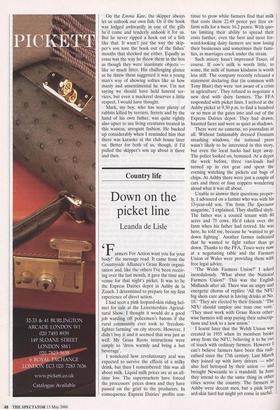Country life
Down on the picket line
Leanda de Lisle
Farmers For Action want you for your body!' the message read. It came from the Countryside Alliance's Grass Roots organi- sation and, like the others I've been receiv- ing over the last month, it gave the time and venue for that night's picket. It was to be the Express Dairies depot in Ashby de la Zouch. I determined to prepare for my first experience of direct action.
I had seen a pink leopard-skin riding hel- met for sale at the Leicestershire Agricul- tural Show. I thought it would do a good job warding off policemen's batons if the rural community ever took to 'freedom- fighter farming' on city streets. However, I didn't buy it and it seemed that was just as well. My Grass Roots instructions were simply to 'dress warmly and bring a hot beverage'.
I wondered how revolutionary zeal was expected to survive the effects of a milky drink, but then I remembered: this was all about milk. Liquid milk prices are at an all- time low. The supermarkets have forced the processors' prices down and they have passed on the grief to the producers. In consequence Express Dairies' profits con- tinue to grow while farmers find that milk that costs them 22.49 pence per litre ex- farm sells for a mere 16.2 pence. With quo- tas limiting their ability to spread their costs further, even the best and most for- ward-looking dairy farmers are now losing their businesses and sometimes their fami- lies, as marriages crack under the strain.
Such misery hasn't impressed Tesco, of course. If cow's milk is worth little, to some, the milk of human kindness is worth less still. The company recently released a statement declaring that (in common with Tony Blair) they were 'not aware of a crisis in agriculture'. They refused to negotiate a new deal with dairy farmers. The FFA responded with picket lines. I arrived at the Ashby picket at 9.30 p.m. to find a hundred or so men at the gates into and out of the Express Dairies depot. They had drawn, haunted faces and were as quiet as shadows.
There were no cameras, no journalists at all. Without fashionably dressed Etonians smashing windows, the national press wasn't likely to be interested in this story, but even the local hacks had kept away. The police looked on, bemused. At a depot the week before, three van-loads had turned up in riot gear and spent the evening watching the pickets eat bags of chips. At Ashby there were just a couple of cars and three or four coppers wondering aloud what it was all about.
Unable to answer their questions proper- ly, I advanced on a farmer who was with his 13-year-old son. 'I'm from The Spectator magazine,' I explained. They shuffled shyly. The father was a council tenant with 80 acres and 75 cows. He'd taken over the farm when his father had retired. He was here, he told me, because he 'wanted to go down fighting'. Another farmer indicated that he wanted to fight rather than go down. Thanks to the FFA, Tesco were now at a negotiating table and the Farmers Union of Wales were providing them with free legal advice. `The Welsh Farmers Union?' I asked incredulously. 'What about the National Farmers Union?' This was the English Midlands after all. There was an angry and energetic chorus of replies: 'All the NFU big shots care about is having drinks at No. 10."They are elected by their friends.' The NFU should employ one man one vote.' `They must work with Grass Roots other- wise farmers will stop paying their subscrip- tions and look to a new union.'
I learnt later that the Welsh Union was created in 1955 when its members broke away from the NFU, believing it to be out of touch with ordinary farmers. However I can't believe farmers have been this radi- calised since the 17th century. Last March they joined up with lorry drivers — who also feel betrayed by their union — and brought Newcastle to a standstill. In June they intend to do the same thing in other cities across the country. The farmers in Ashby were decent men, but a pink leer and-skin hard hat might yet come in useful.


























































 Previous page
Previous page